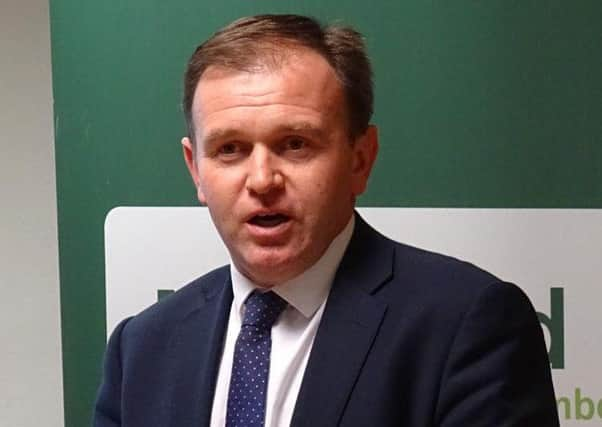Eustice explains his vision for shaping farming's new era


Speaking at the Northern Farming Conference, the MP said the Department for Environment, Food and Rural Affairs would untangle the European Union’s “hopelessly bureaucratic” regulations and that it was a case of determining how, not if, the government would support the industry.
His pledge in Hexham yesterday came as former National Farmers’ Union president Peter Kendall told farmers to prepare for “a different world”, of less financial support and more competition for trade.
Advertisement
Hide AdAdvertisement
Hide AdSir Peter, chairman of the Agricultural and Horticultural Development Board, urged farmers to lobby MPs about the importance of farming and agricultural trade ahead of Britain’s Brexit negotiations with the EU.
He said: “We need to make sure that government is thinking about it (trade) every step of the way.
“We have to make the challenges and opportunities of Brexit, really work for us as an industry.”
The Bedfordshire farmer highlighted how 38 per cent of all British lamb is exported within the EU and how when Foot and Mouth struck in 2007, a situation that prevented British exports into Europe, the farm gate lamb price plummeted by 30 per cent.
Advertisement
Hide AdAdvertisement
Hide Ad“The debate about what sort of trading relationship we have with the EU is absolutely fundamental and the Government needs to be talking about what the solution is,” Sir Peter warned, adding: “How this plays out over the next two to five years is going to be defining for British agriculture.”
Mr Eustice explained Defra’s early approach to a new British agricultural policy, saying: “We have got to start with asking where CAP (the EU’s Common Agricultural Policy) went wrong. Why was it been a failure? The problem with the CAP is it attempts to co-define and regulate every single feature of our landscape and almost every conceivable thing that the farmer might try to do with land. And as a result it is hopelessly bureaucratic.
“As we look to the future we have got an opportunity to start with a clean sheet of paper.”
The Minister said: “For me the question is not whether we have policies that support agriculture, the question is how best can we support agriculture?
Advertisement
Hide AdAdvertisement
Hide Ad“As we engage with different organisations in the months ahead, my challenge to them is think creatively, remove the blinkers of EU membership and let’s together try and build a policy that is coherent, that works and that in a decade from now, the rest of the world will envy and will want to emulate. I’m confident we can do that and for me it starts with untangling the competing and often conflicting objectives of the CAP.”
He said any payments schemes should cater for local eco-systems and that the antagonism between agricultural production and environmental protection must be overcome.
Defra is exploring grant aid and government-backed loans for farmers to invest in improving productivity and profitability on farms, he said, and policy to ease risks for farmers around price volatility, weather, disease and other threats. The merits of US and Canada-style agriculture insurance schemes and Australian tax incentives are also being assessed, he said.